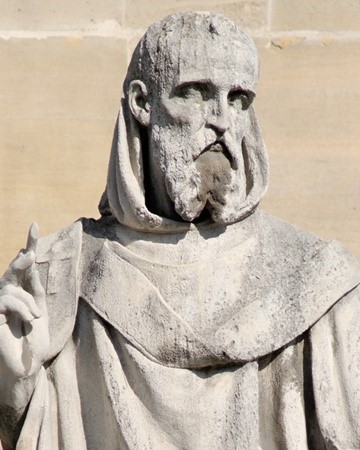– Anastasios
Gregory of Tours (538-594) was a great historian of the Frankish people. He was from a very noble family, born in Clermont. His uncle was the Bishop of Clermont and took care of his education. At the age of 24 he was gravely ill and obtained his recovery after a pilgrimage at the tomb of Saint Martin of Tours.
In 573 the people of Tours acclaim him as their Bishop. The great Christian poet Venantius Fortunatus would sing his elevation as Bishop with the hymn Ad cives turonicos de Gregorio episcopo: “Rejoice, lucky people, here are your recent wishes answered, give thanks to God for the entrance of yours presule. Here comes the hope of the flock, the father of people, the friend of the city. The sheep rejoice: to them a pastor was donated. He received deservedly and regularly the fullness of the priesthood, his name is Gregory, shepherd of the flock that is in the city. Julian sends to Martin, his disciple, offers his brother a gift which was dear to him. The beneficial hand of Father Igidio consecrated him to the Lord to raise up the people and became the object of Radegonda’s affection. To this investiture applaud festants Sigiberto and Brunichilde: his rise is ennobled by the king’s assent. May he bear without fail his sheepfold, with tireless attention: no looting threaten the flock entrusted to him. Keep locked up the lambs with their precious mantle and taking care of them will protect their sleep.” He was the author of Historia Francorum and De Gloria confessorum.
In 1916 E. Brehaut translated the masterwork of Gregory, Historia Francorum, in English. Let us read a passage where he is speaking about Saint Martin of Tours: “In the second year of the reign of Arcadius and Honorius, Saint Martin, bishop of Tours, departed this life at Candes, a village of his diocese, and passed happily to Christ in the eighty-first year of his life and the twenty-sixth of his episcopate. A man full of miracles and holiness, doing many services to the infirm, He passed away at midnight of the Lord’s day, in the consulship of Atticus and Cæsarius. Many heard at his passing away the sound of psalm singing in heaven, which I have spoken of at greater length in the first book of his Miracles. Now as soon as the saint of God fell sick at the village of Candes, as we have related, the people of Poitiers came to be present at his death, as did also the people of Tours. And when he died, a great dispute arose between the two peoples. For the people of Poitiers said: “As a monk, he is ours; as an abbot, he belonged to us; we demand that he be given to us. Let it be enough for you that when he was a bishop on earth you enjoyed his conversation, ate with him, were strengthened by his blessings and cheered by his miracles. Let all that be enough for you. Let us be permitted to carry away his dead body.”
To this the people of Tours replied: “If you say that the working of his miracles is enough for us, let us tell you that while he was placed among you he worked more miracles than he did here. For, to pass over most of them, he raised two dead men for you, and one for us; and as he used often to say himself, there was more virtue in him before he was bishop than after. And so it is necessary that he complete for us after death what he did not finish in his lifetime. For he was taken away from you and given to us by God. If a custom long established is kept, a man shall have his tomb by God’s command in the city in which he was ordained. And if you desire to claim him because of the right of the monastery, let us tell you that his first monastery was at Milan.” While they were arguing in this way the sun sank and night closed in. And the body was placed in the midst, and the doors were barred and the body was guarded by both peoples, and it was going to be carried off by violence by the people of Poitiers in the morning. But omnipotent God was unwilling that the city of Tours should be deprived of its protector….
Reading the chronicles of Saint Gregory is certainly very good for the understanding of the struggles of our distant brothers in faith.


 Follow
Follow


